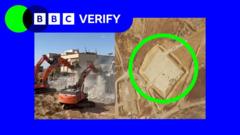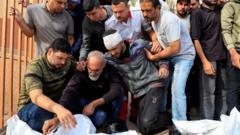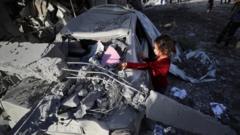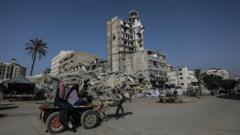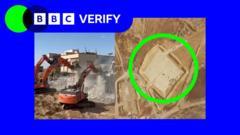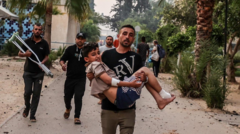Thirty-three children from Gaza have recently been evacuated to Jordan for medical treatment, highlighting the challenges families face in their search for safety and care. The evacuation comes amid ongoing conflicts, significant humanitarian issues, and logistical hurdles for those attempting to escape the dire conditions in Gaza.
Jordan Welcomes Vulnerable Gazan Children for Medical Care Amidst Ongoing Conflict
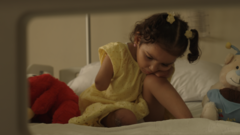
Jordan Welcomes Vulnerable Gazan Children for Medical Care Amidst Ongoing Conflict
As Gaza grapples with intensifying violence and humanitarian crises, Jordan opens its doors to sick children and their guardians, providing a glimmer of hope and care amidst devastation.
As the helicopter soared towards Amman, illuminated by the warm glow of the setting sun, the stark contrast between the tranquil Jordanian landscape and the turmoil of Gaza became vividly apparent. Safa'a Salha, a mother from Gaza, couldn't contain her awe as she expressed, "Oh my God, Jordan is so beautiful," via a text message on her phone.
In a poignant moment shared onboard with Youssef, her 16-year-old son who has endured a scar from previous surgery—including his eagerness to move on from the horrors of Gaza—Safa'a highlighted the profound psychological shifts experienced by those fleeing conflict. Next to them sat Sama Awad, a fragile nine-year-old girl with a brain tumor, who looked to her mother, Isra, for reassurance as they prepared for urgent medical attention in a foreign land.
The group included a total of 33 children, accompanied by parents and guardians, who were transported from Gaza to the Jordanian border, marking a small success in a larger evacuation plan initially introduced during a February meeting between US President Donald Trump and King Hussein of Jordan. The aim was ambitious—2,000 sick children to receive necessary treatment in Jordan—though bureaucratic hindrances and escalated hostilities have severely limited the pace of evacuations.
Jordanian authorities reported frustrating delays and restrictions imposed by Israel, echoing broader concerns about the impact of ongoing warfare on humanitarian efforts. A senior Israeli official from COGAT acknowledged: "Since the beginning of the year, and especially in recent weeks, there has been a significant increase in the number of Gazans evacuated through Israel for medical care abroad." Despite this claim, the unfortunate reality is that the ongoing bombardments continue to inhibit crucial medical evacuations.
Reports from humanitarian organizations illuminate the dire situation in Gaza, with over 2.1 million people facing the prospects of famine. Tom Fletcher, the UN's humanitarian affairs chief, recently urged the Security Council to intervene decisively to prevent further suffering, describing the conditions as "horrible beyond words."
Among the evacuees, Habiba Al-Askari's case stands out, having lost three limbs to a rare skin condition and undergoing surgery in Jordan. Her mother, Rana, reflected on the uncertainty of returning home, acknowledging the destruction left behind yet expressing an undying love for Gaza, stating, "To me, Gaza will always be the most precious spot on this entire earth."
As the situation remains in flux with rising conflict and existing humanitarian challenges, the fate of those remaining in Gaza, and the hopes of evacuees to return, continues to hang in the balance.

